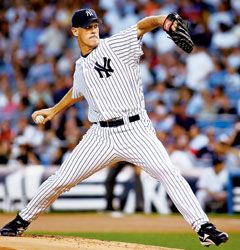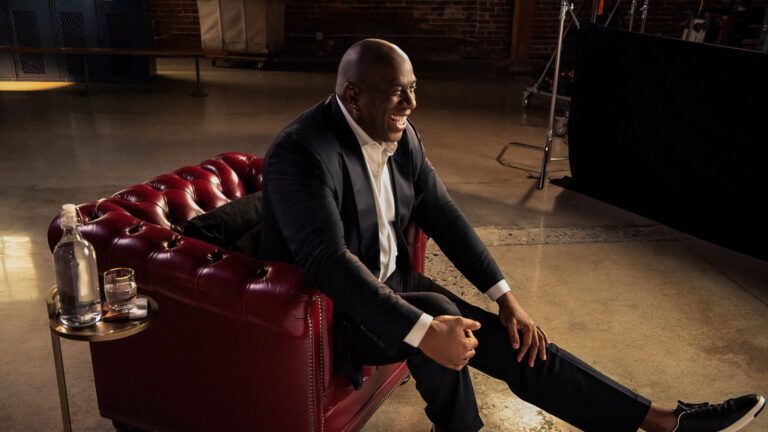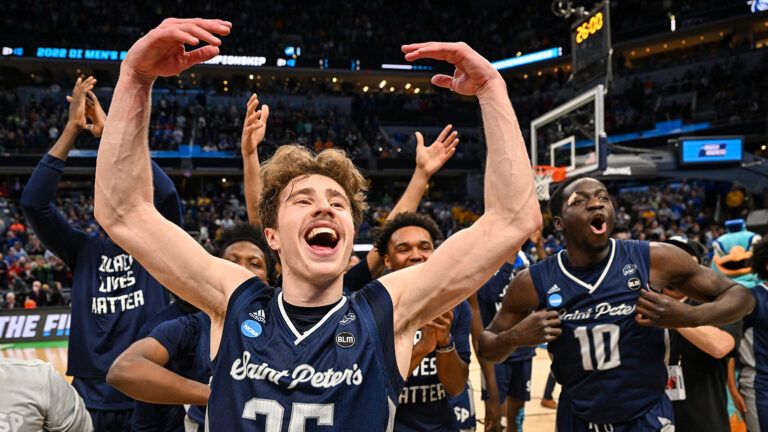The sound. A year later I can close my eyes and still hear it. Fifty-five thousand New York Yankees fans rising from their Yankee Stadium seats and cheering me.
I'd just pitched my heart out for more than six innings in a late season, do-or-die game against our archrivals, the Boston Red Sox. The division title was on the line.
Throwing sinkers, working the corners of the plate, I'd held the Sox to three runs while we'd scored eight. Me, a journeyman pitcher who'd spent most of his 17-year professional career kicking around the minor leagues, barely hanging on. Who the Yankees had called up as a last resort, after they'd exhausted all their other pitching options.
"Way to go, way to battle," manager Joe Torre said, when he got to the mound. He was smiling. Probably a little surprised. I handed him the ball and began to walk toward the dugout. The bullpen would take it from here.
The organist started playing "It's a Small World." The fans applause kept building. Think how close you came to missing this, I told myself, as players hugged me and clapped me on the back on the dugout step. You see, two months earlier, I had nearly quit the game.
Quitting. Growing up in California, the son of a minister, I had never allowed quitting to be a part of my vocabulary. I believed in myself—and in God's will for me.
When the Toronto Blue Jays drafted me in the 22nd round out of high school in 1989, I knew I wasn't star quality. I wasn't even good enough to get a scholarship at a four-year college or university. But playing big-league ball was my dream.
I was a skinny kid, six-foot-four and 165 pounds. One of the Toronto scouts told my dad they'd signed me as a projection pick—they figured I'd fill out and get stronger over the next few years.
They were right about my getting stronger. But I never developed the overpowering fastball they'd predicted. Six long years later I was still stuck in the minors.
In 1994, when I was 22 and entering what should have been my prime, the team sent me an unambiguous message. They shifted me from starting pitcher to middle reliever. A clear demotion. I called home. "What are you going to do?" my dad asked. "I'm going to make them notice me," I said. Nothing would deter my dream.
I prayed often that spring. Not for a bigger fastball or better control, but for the strength to persevere. The prayers helped. Well, maybe. One day in June, as I was getting dressed at my locker, my manager pulled me aside.
"The big club wants you," he said. "You're going to Toronto." I thought I'd shot the moon. But not every dream has a happy ending.
In fact, the Blue Jays were playing the Yankees that night. The Yanks knocked out Toronto's starter, and I got called in. You've waited your whole life for this, I thought, as I strode to the mound.
I took a deep breath and surveyed my fielders. I checked the runner on first. I threw my first big-league pitch. Strike. One pitch later I retired the batter on an infield grounder. Next up was star outfielder Paul O'Neill. I hung a slider out over the plate. Boom! He clobbered it over the right-field wall.
Somehow I finished the inning. It wasn't pretty—two runs on five hits and two walks. After the game, the manager called me into his office. "We're sending you back down," he said.
My career was like a yo-yo after that. I played for 13 teams in eight years before finally landing with Atlanta's minor-league Richmond, Virginia, club in 2002.
By then I was 30 years old and married with two children. I was way too old to be considered a prospect. Atlanta was honest with me. They were bringing me on more for my experience than for my ability. "We're signing you as an insurance policy, Aaron, in case one of our pitchers gets injured," I was told.
Early in the season, when one of Atlanta's pitchers went down, I got my chance. I walked into the Atlanta clubhouse and was nearly overcome by emotion. I hadn't pitched in the majors in four long years.
That night, everything fell apart. I entered the game in the ninth inning with the bases loaded and immediately gave up a bases-clearing double. My shoulders slumped. My golden opportunity, maybe my last opportunity, and I wasted it.
A few days later I returned to the minors, again.
Why I kept pitching after that, I'm not sure. Partly it was because we needed the money. Mostly, though, it was because I couldn't give up the dream. Why would God have put this desire into my heart if he hadn't wanted me to succeed? "I've devoted my life to the game," I told my wife, Macy. "It's not something I can just walk away from."
And so I kept at it. The Marlins, The A's, the Diamondbacks, the A's again, the Braves again, and finally back to the Marlins—all in the minor-league systems.
When the Marlins dropped me after the 2004 season, I knew the score. I was 33 years old, out of the running. So I was surprised when the Yankees offered me a minor-league contract that winter. "Maybe they see something in me," I told Macy. It's funny about ballplayers. Even the slightest chance keeps us going.
The Yankees sent me to Columbus, their top farm club. I threw okay, but it didn't seem to matter. I felt like a ghost. Every time a Yankees pitcher got hurt, a reporter would approach. "Word is, they're going to call you up," he'd say. It never happened. The club chose other guys instead.
The three-day All-Star Game hiatus was coming up. I couldn't wait to drive the six hours to my family in Tennessee. Three days away from baseball, I thought. I stopped myself. When have I ever wanted to escape the game before?
That day, with all my pent-up frustration percolating, the manager signaled me to the mound. The score was tied, with a runner on second. I tried to clear my head. Gotta hold this lead and turn the game around.
I wound up and fired. Crack! The first batter ripped a shot down the first-base line. Our first baseman misplayed it and a run scored. Something in me snapped. I turned toward the first baseman and bellowed at the top of my lungs. I'd never done anything like that in my career.
All 1,500 people in the stands heard me. I've never felt so embarrassed. Here I am the team's chapel leader, and I'm acting like a fool, I thought. What's this game doing to me? I apologized to our first baseman, but the damage was done. I headed home right after the game. For six hours I kept asking myself, Why am I still hanging on?
I never mentioned a word of what had happened to Macy. I wanted to enjoy the time I had with my family, to flush baseball from my mind. Secretly, I'd decided to play out the season, then return home and find a new career.
The drive back to Columbus three days later was the longest of my life. I wanted to call Macy and my parents and tell them I wanted to quit. Instead, I pulled off the highway and called Bruce Sinclair, our team chaplain, and unburdened myself. "Pray for me," I said. "Not that I pitch well at Columbus or that I get called up to the Yankees. I'm just looking for peace. Peace with whatever happens."
Bruce and I prayed for 10 minutes. We prayed hard—for wisdom, for acceptance, for peace. When we finished, I felt as if a great weight had been lifted. I drove to Columbus, feeling as relaxed as I'd been in months.
I headed to the ballpark. I was the scheduled starting pitcher that night. But my name was missing from the lineup card. A teammate spotted me. "The manager is looking for you," he said. Oh, no, I thought, they're cutting me loose.
I found Bucky Dent, the manager, in his office. "Hey, Smalley," he said. I braced myself. He smiled. "Pack your things. You're going to the big leagues."
I stood there gaping like some kind of school kid. "You serious?"
"I'm serious," he said.
The first person I called was Bruce Sinclair. Then I called my wife and parents.
My first start was against the Texas Rangers, in Texas. My family flew in. We all knew without saying a word: This is it.
I walked to the mound. A sensation I hadn't experienced on the field in years engulfed me: peace. A total, unearthly peace. No one expects a thing from me, I thought. What do I have to lose? For the first time in years, I relaxed on the mound. I just had fun. I got in a jam in the first inning, but struck out a batter to retire the side.
After that, everything clicked. When I left the game in the sixth inning, we had a comfortable lead. The game ended and then it hit me: I just won a game for the New York Yankees. That night, I didn't sleep.
The unbelievable happened. I compiled a perfect 10-0 record over the course of the season, including that big win over the Red Sox at Yankee Stadium when I got the standing O after Joe Torre took the ball from me.
In the papers, the players talked of how they could count on me, how I'd helped pitch the team to the playoffs. Me!
I have learned a lot in my life as a ballplayer, about perseverance, about priorities, about dreams. A dream is also a test…a test of faith.
The turnaround for me did not come on the field. I wasn't even in uniform when it happened. It came on that phone call to Bruce Sinclair and the praying we did. I didn't need a better fastball. What I needed was the peace that came with acceptance. With that peace, anything is possible.




